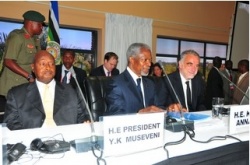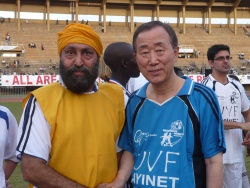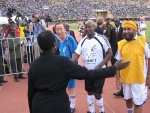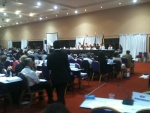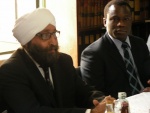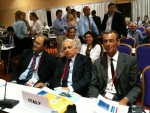ICC agrees on a mechanism for prosecution of crimes of aggression
On 12th June 2010 the Review Conference of the Assembly of State Parties of the Rome Statue concluded in Kampala, Uganda. One of the main developments during the conference was an agreement on a mechanism by which the crime of aggression could be prosecuted at the International Criminal Court (ICC) - the world’s first permanent war crimes court. From 31st May to 11th June 2010 around 4600 representatives from ICC Assembly of State parties, observer states, international organisations , NGO’s and other participants discussed he proposed amendments to the Rome statute - the court’s founding treaty. The conference was opened by UN Secretary General Ban Ki-moon and included former Secretary General Kofi Annan, Uganda’s President Yoweri Museweni and Tanzania’s President Jakaya Kikiwete among the world leaders.
The Secretary General made it clear that the ‘the old era of impunity was over’ and that for perpetrators of war crimes, there was ‘no safe place to hide.’
Details of resolutions adopted
The conference adopted a resolution by which it amended the Rome Statute so as to include a definition of the crime of aggression and the condition under which the court could exercise jurisdiction with respect to the crime.
The conference based the definition of the crime of aggression on the United Nation’s General Assembly resolution 3314 (xxix) of 14th December 1974 and in this context agreed to qualify as aggression a crime committed by political or military leader which, by its character, gravity and scale constituted a manifest violation of the charter.
Use of force criminalised
The resolution, in effect, criminalises the use of force (for example: blockades, invasion, bombardments) against another country in violation of the charter of the United Nations giving the court the power to try future political and military leaders who plan, prepare, initiate or execute illegal wars and to hold them (individually) criminally responsible to the commission for this new, and long overdue, international crime.
The international criminal court has jurisdiction over four categories of crimes: crime of aggression, genocide, crime against humanity and war crimes. Former Serbian leader Slobodan Milosevic and former Liberian leader Charles Taylor are among those who have already been called to justice.
Charity football match
The review conference was preceded a day before by a charity football match in honour of the victims of war of the Lord’s Resistance Army (LRA) in Northern Uganda whose leader Joseph Kony has been indicted by the ICC. Uganda’s President Yoweri Museveni led the Justice team for the VIP’s and United Nations Secretary General Ban Ki-moon led the Dignity team for the victims before a crowd of 2500 spectators including international diplomats and dignitaries at the Mandela National Stadium in Kampala.
Both President Museveni and the Secretary General Ban Ki-moon wearing their football kit were received on the pitch by Christian Wenaweser, President of the Assembly of State Parties and Justice Anup Singh Choudry a member of Uganda’s delegation to the conference and a judge of newly established Uganda’s war crimes court set up to complement the ICC in Hague.
Justice Choudry played as the goalkeeper in the Dignity team led by President Museveni which beat UN leader’s team 1--0. Justice Choudry also led the ICC delegation to meet the victims of the war in northern Uganda.
Picture Gallery
Gallery
- ICC Review Conference: Kampala 2010
- Error creating thumbnail: File with dimensions greater than 12.5 MP
See also
- Anup Singh Choudry
- Sikh Pilgrimage to Pakistan
- Baba Nanak University
- History, Science and Sikhism
- Guru Nanak's Philosophy
